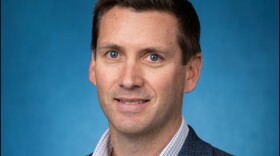-
The federal administration has targeted environmental agencies and protection programs in its efforts to reshape the government. The Environmental Protection Agency has seen layoffs and firings and budget cuts. Now, there is a government shutdown creating more issues. WEMU's David Fair discussed immediate and longer-term impacts with Greg Dick, the Director of the Cooperative Institute of Great Lakes Research in Ann Arbor.
-
The Department of Energy sent an email to employees directing them to avoid language like “climate change.” WEMU’s Caroline MacGregor spoke to a University of Michigan climate scientist about the implications.
-
In September, The University of Michigan will hold its first Climate Week. The idea is to create a series of events and activities to further engage the community in climate action and sustainability. It comes against the backdrop of dramatic rollbacks in environmental and climate protections at the federal level. Dr. Shalanda Baker is the school's first-ever Vice Provost for Sustainability and Climate Action. She discussed that and more with WEMU's David Fair and Michigan League of Conservation Voters executive director, Lisa Wozniak.
-
You may have noticed there have been some changes in the nature of our weather. Climate change is cited as the reason for some notable changes in precipitation patterns in our corner of the world. What does that tell us about the near- and longer-term future in Washtenaw County? WEMU's David Fair discussed this with Dr. Drew Gronewold, Associate Professor at the University of Michigan School for Environment and Sustainability.
-
Jonathan Taylor Overpeck is an American climate scientist and globally recognized climate researcher. Since 2017, he has served as the Samuel A. Graham Dean and Professor at the University of Michigan School for Environment and Sustainability. WEMU’s Caroline MacGregor caught up with Overpeck to discuss where we stand with climate change today.
-
A globally recognized climate researcher with the University of Michigan says the U.S. lags behind countries that have embraced solar and renewable energy over fossil fuels. WEMU’s Caroline MacGregor reports.
-
The Huron Valley Chapter of the Michigan Botanical Society will host a discussion about a 50-year plan to restore and maintain a unique wetland ecosystem situated 14 miles north-northwest of Ann Arbor. WEMU’s Ana Longoria has more.
-
Energy costs are a significant problem for many in our community, and utility bills are going up everywhere. In this month's installment of “1st Friday Focus on the Environment”, we look at the issue of energy equity with Dr. Tony Reames. He is Director of the Detroit Sustainability Clinic at the University of Michigan's School for Environment and Sustainability. Dr. Reames joined WEMU's David Fair and Michigan League of Conservation Voters executive director Lisa Wozniak with an assessment of where we are on energy equity and where we're headed.
-
As climate change exacerbates wildfires out west, it could mean longer-term change for Michigan. WEMU’s Ana Longoria has the story.
-
What do you think one single animal can tell you about the health of the environment? It turns out quite a bit. Innovative research at the U-M’s School of Environment and Sustainability is using animal tracking data to document environmental and ecological threats and to advance conservation strategies. WEMU's David Fair spoke with Dr. Scott Yanco about the research and what it is telling us so far.

Play Live Radio
Next Up:
0:00
0:00
Available On Air Stations










